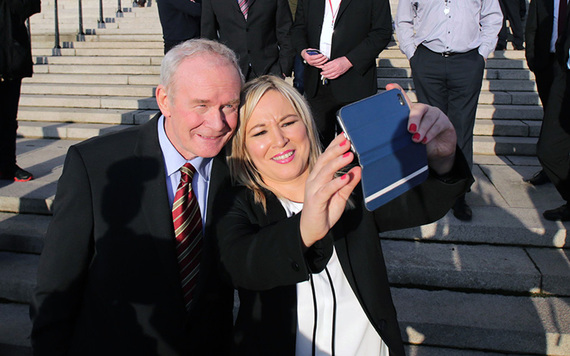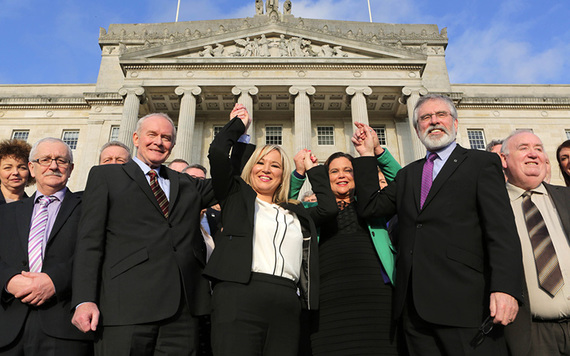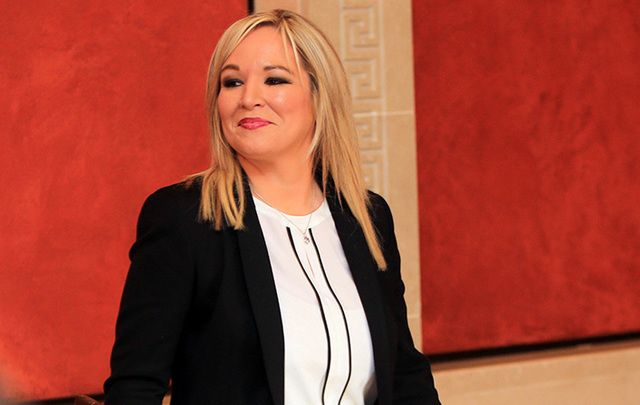The Sinn Féin party has entered a new and unpredictable era with the choice of a female leader in the north of Ireland, Michelle O’Neill, who comes from a different generation to Gerry Adams and Martin McGuinness.
Sinn Fein may well have a female leader south of the border too, where Mary Lou McDonald is expected to eventually succeed Gerry Adams.
Having just turned 40 years of age, Michelle O'Neill did not go through the same experience of the Troubles as Adams, who is 68, and McGuinness, who was born in May 1950.
Although she has served as Agriculture Minister and more recently as Minister for Health in the Belfast-based power-sharing government, O’Neill is a relatively-unknown quantity outside the ranks of her own party.
She speaks very quickly and comes across as articulate and self-confident, but how she will fare in the difficult times ahead remains to be seen.
Sinn Féin’s withdrawal from the Stormont executive (northern government) following a disagreement with its partners, the Democratic Unionist Party, means the north is facing a general election on March 2.
The retirement of Martin McGuinness as party leader in the north on grounds of ill-health is a serious setback for Sinn Féin. His record as a leader of the Irish Republican Army and later as a peacemaker and conciliator proved a strong vote-winning combination with large elements of the nationalist population in the north.

Martin McGuinness and Michelle O'Neill taking a selfie on the steps of Stormont.
On the one hand, the Derry man’s reputation as an IRA activist was reassuring to those with a similar background and it helped to quell any doubts they may have retained about the peace process. Meanwhile, his very cordial relationship with the previously-hardline unionist leader, the Reverend Ian Paisley – the pair became known as “The Chuckle Brothers” – helped to garner support among moderate nationalists as well as allaying unionist fears.
Michelle O’Neill belongs to the post-conflict generation of nationalists and republicans, most of whom see politics, rather than paramilitary activity, as the way forward. However, her family background is strongly Irish republican.
She was born Michelle Doris on January 10, 1977 and brought up in the country village of Clonoe, County Tyrone. Her father, Brendan “Basil” Doris, who died in January 2006, was a former IRA prisoner who later became a Sinn Fein member of Dungannon Borough Council. When he stepped down from the Council in 2005, daughter Michelle got elected to the seat that he vacated and later became the first woman mayor of the borough.
Married to Paddy O’Neill, she has two grown-up children, Saoirse and Ryan. Her uncle, Paul Doris, is president of Noraid, the US-based republican support and fundraising organization. Another Assembly-member at Stormont, Conor Murphy, who is a former IRA prisoner from South Armagh, had also been tipped as a possible leader of the party in the north.
Michelle O’Neill’s most immediate challenge is the general election at the beginning of March. The outgoing Stormont Assembly had 108 members but the next one will only have 90, as the number of seats in each of the 18 constituencies is being reduced from six to five.
The last election was held only last May and, unless the mood of the voters has changed significantly, then the balance of forces may not be greatly altered this time around.
In the May 2016 election, the Democratic Unionist Party won 38 of the 108 seats and Sinn Féin took 28. If the same voting pattern applied next time and when allowance is made for the reduction in the total number of seats to 90, then the DUP would have 32-34 Members of the Legislative Assembly and there would be 23-25 Sinn Féin MLA’s.
The Ulster Unionist Party would be expected to hold almost all of its 16 Assembly seats and the Alliance Party to retain something close to its current total of 8 MLA’s.
But it could prove a difficult election for the SDLP since five of the party’s current 12 MLA’s were elected to the sixth seat in their constituencies under the Single Transferable Vote system and now there will be only five seats in each location. Sinn Fein's John O’Dowd, a former Education Minister, is also facing a tough election as he took the sixth and final seat last time in the constituency of Upper Bann.
The reason given by Sinn Féin for pulling out of the power-sharing executive in Belfast was the controversy arising from the Renewable Heat Incentive or “cash-for-ash” scheme which allowed substantial benefits for business and other non-domestic users, but at massive cost to the taxpayer. A whistle blower has claimed that one farmer, for example, intended to collect about £1m over a period of 20 years for heating an empty shed
This scheme was introduced and implemented under DUP ministers, including the party leader Arlene Foster. Sinn Féin seized the opportunity to take the high moral ground on the issue and urged Foster to step aside from her post as First Minister while an inquiry took place. When she refused, Sinn Féin pulled the plug on the current administration and the north now faces its second election in 10 months.
There are reports also that the grassroots membership of Sinn Féin was increasingly unhappy with the set-up at Stormont, feeling that the nationalist community in the north was gaining little from the power-sharing arrangement and that the DUP was not cooperating sufficiently in the creation of a fairer and more equal society.

Sinn Fein gathers in celebration outside Stormont.
Whether or not the election will resolve any of the issues that caused it in the first place is an open question. It is critically important for Sinn Féin to maintain or even improve upon its current strength relative to other parties in the assembly, but there is no guarantee that this will be the outcome when the votes are counted.
This is the scenario that faces the new Sinn Féin leader in the north. After she finished school at St Patrick's Academy in Dungannon, Michelle O’Neill was training to become an accounting technician but began working for Sinn Féin after the 1998 Good Friday Agreement. She was elected to the Stormont Assembly for the constituency of Mid-Ulster in 2007 and became her party's spokeswoman on health issues.
Four years later, in 2011, Sinn Féin appointed her as minister for agriculture. The farming community in the north of Ireland includes a large number of unionists, but she appeared to get on well with people from a different political and community background.
A new assignment came her way in 2015 when she became minister for health, one of the more high-profile and challenging positions in Northern Ireland politics. A ten-year plan that she produced for the improvement of the health system has been criticized by political opponents for lacking detail.
At the announcement of her new position, Michelle O’Neill was accompanied by Dublin-based Mary Lou McDonald, the party’s deputy leader, who is expected to take over from Gerry Adams when he steps down at some unspecified date in the future. Sinn Féin would then have women leaders on both sides of the Irish border.
Read more: President Trump now in charge of U.S. Irish policy
* Deaglan de Breadun is a former Northern Editor of The Irish Times. He is the author of "Power Play: The Rise of Modern Sinn Féin" published by Merrion Press in 2015.




Comments